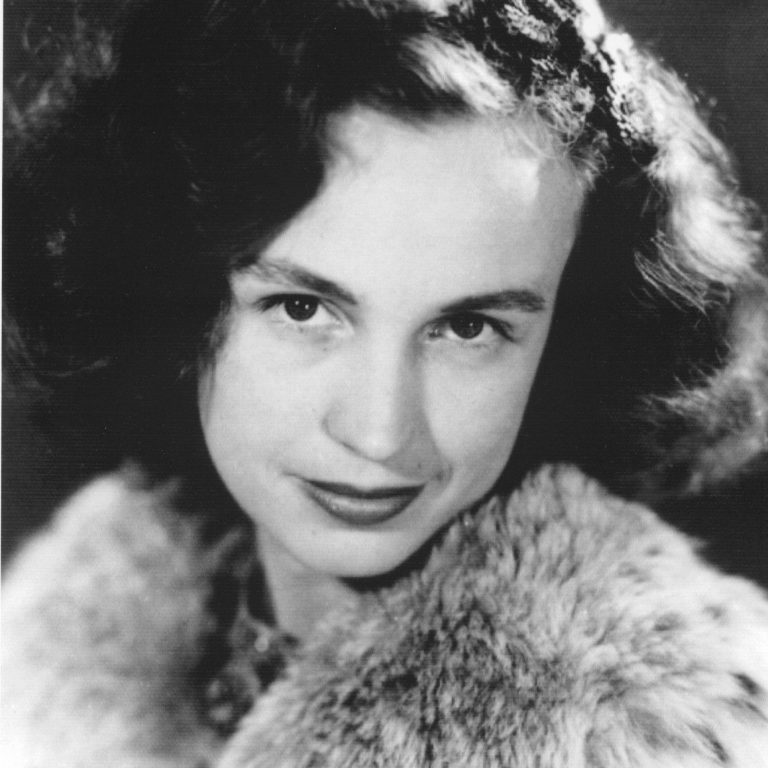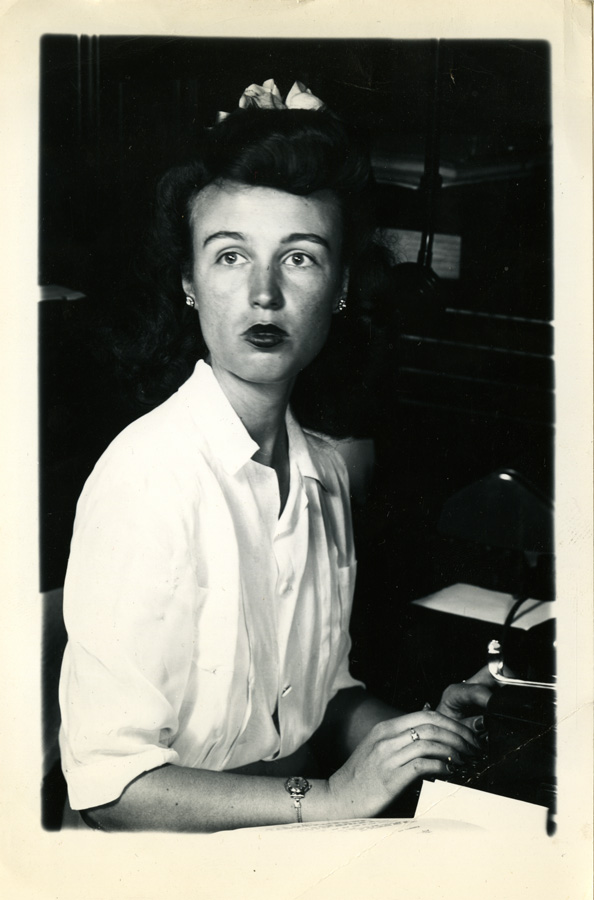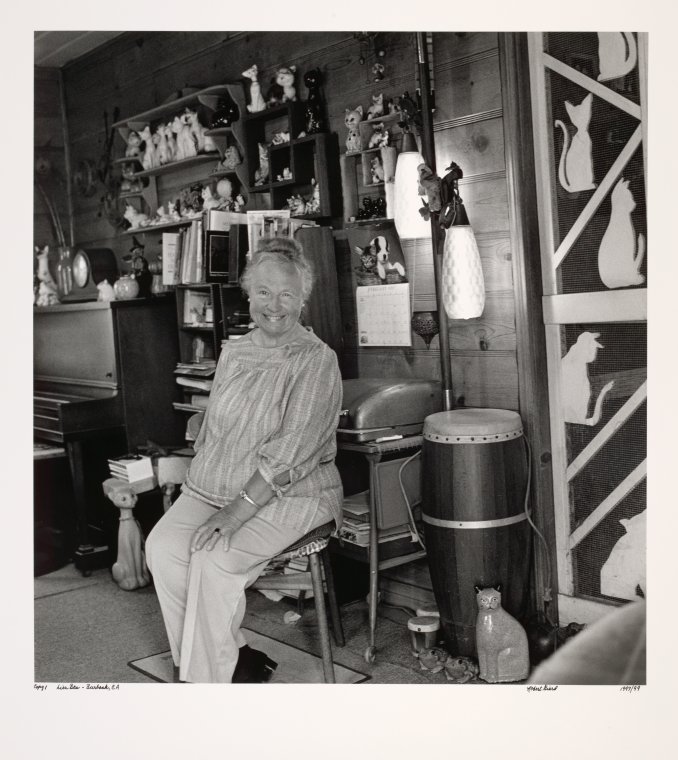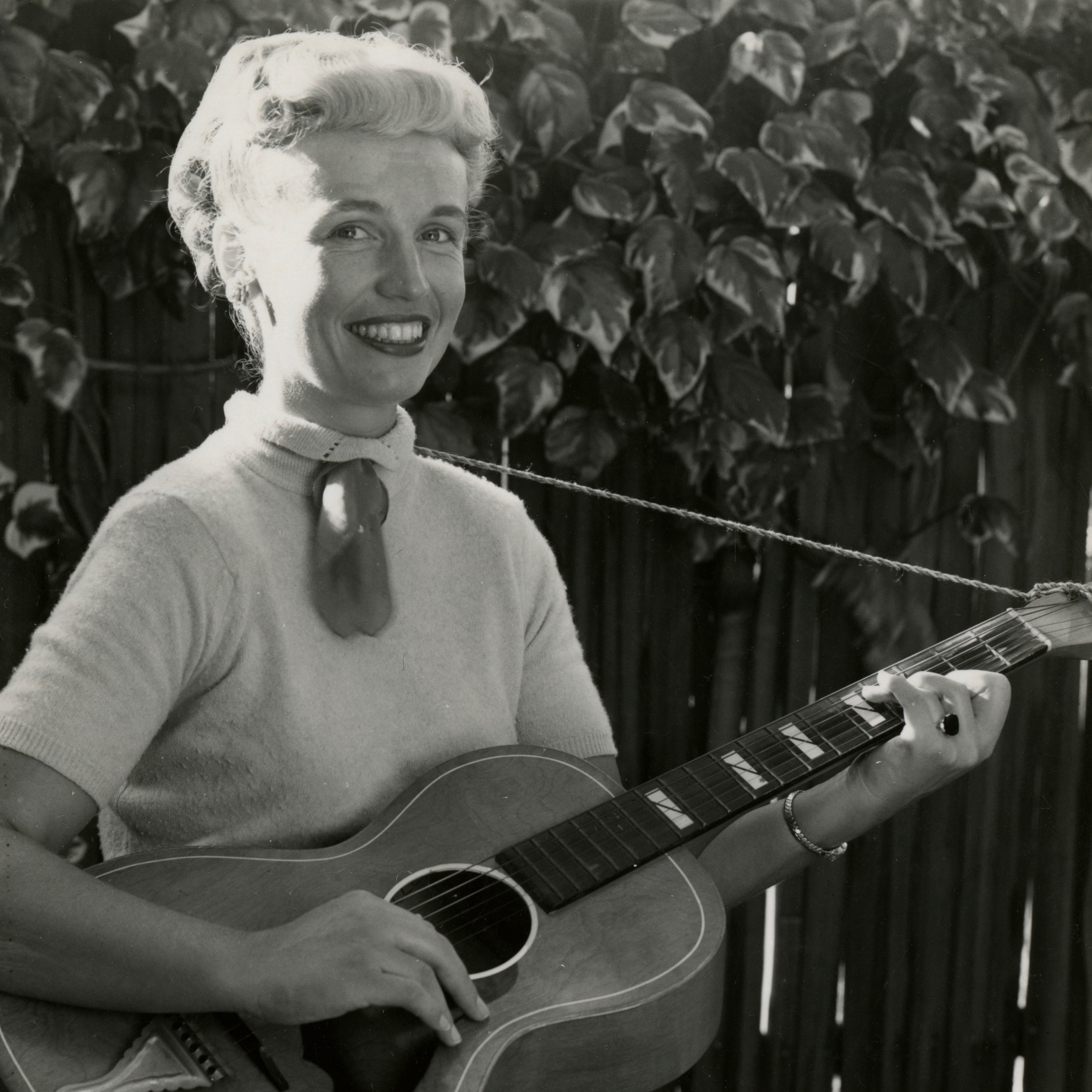Edythe Eyde
 Edythe Eyde looking glamorous in an undated photo.
Courtesy of ONE Archives at the USC Libraries.
Edythe Eyde looking glamorous in an undated photo.
Courtesy of ONE Archives at the USC Libraries.Episode Notes
From Eric Marcus: Edythe Eyde, aka Lisa Ben, moved to Los Angeles in 1945 and by 1947 was working as a secretary at RKO Pictures where she used her office typewriter as a printing press to anonymously publish her landmark “magazine” for lesbians, Vice Versa.
In the 1950s, when Edythe started writing for the The Ladder, the Daughters of Bilitis magazine (DOB was an organization for lesbians founded in 1955), she took the pen name “Lisa Ben” (an anagram for “lesbian”). Her first choice for a pen name had been “Ima Spinster,” but that idea was shot down by the magazine’s editors. Edythe told Eric Marcus, “I thought that was funny and they didn’t. I don’t know whether they thought it was too undignified or what, but they objected strongly. If I had been as sure of myself then as I am these days I would have said, ‘Alright, take it or leave it.’ But I wasn’t. So I invented the name Lisa Ben.”

Until five years before her death at the age of 94, Edythe lived in the Burbank, California, bungalow that she had paid for with earnings from her work as a secretary—work she hated. When age compelled her to give up her house and move to an assisted living facility, Edythe also had to give up the company of her thirteen cats, which proved to be a devastating loss.
To learn more about Edythe Eyde, we recommend exploring the resources and links that follow below.
———
Edythe Eyde’s papers and photographs are housed at the ONE Archives at the USC Libraries.
All nine issues of Vice Versa are reproduced in full on Queer Music History’s website.
The Daughters of Bilitis Video Project recorded an interview with Eyde in October 1988, which is available through the Lesbian Herstory Archives. You can watch here.

Scholar Kate Litterer has taken a deep dive into Eyde’s collection at the ONE Archives at the USC Libraries to learn everything she can about “this fascinating, funny, talented creator. The more I study Ben, the more I learn about just how far her talents reached: she was a talented editor and writer, thoughtful musician, and cutting-edge sci-fi and poetry author.” Learn more about Litterer’s work here.
The Washington Post‘s podcast series on World War II letters featured an episode about the letters of Eyde to her soldier cousins. The accompanying article includes background on Eyde’s life prior to her move to Los Angeles.
In 2010, NLGJA: The Association of LGBTQ Journalists welcomed Eyde into its Hall of Fame.
To learn more about how Eyde created Vice Versa, we recommend Rodger Streitmatter’s Unspeakable: The Rise of Gay and Lesbian Press in America, which chronicles the stories of many gays and lesbians who created LGBTQ-oriented publications.
To learn more about Eyde and 21 other lesbian writers, read Kate Brandt’s Happy Endings: Lesbian Writers Talk About Their Lives and Work.
———
Episode Transcript
Eric Marcus Narration: I’m Eric Marcus and this is the Making Gay History podcast.
In our third episode you’ll meet Edythe Eyde, whose pen name was Lisa Ben. Back in the 1950s, a lot of people who got involved in the movement didn’t use their real names because if you were found out you could lose your job and even lose your family.
But Edythe’s story starts even before that, in 1947, when she published what she called Vice Versa, “America’s Gayest Magazine.”
It was a newsletter, for lesbians. She typed it on her office typewriter at RKO Pictures where she was a young secretary. Her boss told her she should look busy, but not knit and not read. So what do you do? You write a newsletter for lesbians in 1947 and give them out to your friends.
But before she could tell me her story, I had to find her. And all I had to go on was her pen name and that she lived in California. It took me three months and 26 phone calls to find her. This was pre-Internet, so there was no choice. And on the 26th phone call, she answered. So not long after, I was sitting with her on her enclosed front porch with two of her 13 cats. She’d bought the house with money from years working as a secretary. She hated working as a secretary.
I’d read that Edythe was well-known in the ‘50s for singing parodies of popular songs in Los Angeles gay clubs. She wrote her own lyrics as a protest against the demeaning jokes gay entertainers told for the benefit of straights. And, if you can imagine, the straights would show up at the clubs in the evening to see how the other half lived and they’d stand in the back.

So I asked Edythe if she could sing a few songs for me. So, here she is, Edythe Eyde, live from the front porch of her Burbank bungalow. You can’t not smile.
———
Eric Marcus: Okay.
Edythe Eyde: Uh, I’m off now?
EM: You’re on.
EE: Oh, I’m on?
EM: You can test, and I’ll just…
EE: Oh, okay…
EM: … you’re ready to warm up.
EE: Yeah, I need to warm up a little bit. I should tune up a little bit first.
[Singing] Hello young lovers, whatever you are
I hope your problems are few.
All you cute butches lined up at the bar
I’ve had a love like you.
I knew the way I felt, but I didn’t know how to go about finding someone else that was that way and there was just no way to find out in those days. You know, everything was pretty closed about things like that.
I wrote Vice Versa mainly to keep myself company because I thought that although I don’t know any gay gals now, by the time I finish a couple of these magazines I’m sure I will. I was such a little optimist. And then I’ll hand the magazines out for free. I never charged for them. I felt that that would be wrong. But, uh, it was just some writing that I wanted to do to get it off my chest and I was a very lonely person and I could sort of fantasize this way by writing the magazine, you see.
And so that’s the way the magazine was. And I put in five copies at a time with carbon paper and I wrote it through twice, so that made 10 copies of Vice Versa. That’s all I could manage. You see, there were no duplicating machines in those days.
I would also say to the girls as I passed the magazines out, “Now when you get through with this, don’t throw it away. Pass it on to another gay gal.” We didn’t use the term “lesbian” so much then. We just said “gay gal.”
EM: Mm.
EE: And I said, and that way, although… it will pass from friend to friend. And it’s not dated material, so it will never get stale. I mean they’re just fiction and poetry and that sort of thing, book reports and things of that nature. There were very few books around at the time, but I wrote a book review on The Well of Loneliness, and a couple of other ones I can’t remember.
And then if there were any movies around that had the slightest tinge of two girls being interested in one another or something, I would take that story within the movie and play it up and say, “Oh, such and such a movie has a scene in it with two young ladies and they seem to be interested in one another or something like that.” I would play it up. And then I wrote poetry, not a great deal of it, but a few things.
And, uh, then, uh, oh I’d write the end… the “Watchama-Column.” And that was just ideas that happened off the top of my head that I would write about and say, “Wouldn’t it be wonderful if…” Or, you know, I’d just sort of, uh, uh, fantasize about… Not fantasize exactly, but…
EM: Imagine?
EE: Imagine, thank you, umm, uh, fantasize about how things might be in the future with us or something like that.
It was a sort of a light thing, a frivolous thing, it wasn’t anything of great merit, I don’t think, but it was just to round out the magazine because I was getting awfully scarce on material.
EM: What were some of the things you imagined in your columns?
EE: Well, I imagined that perhaps we would have a lot of magazines and that perhaps even movies might be made about us. And, uh, I would hope that someday we would not be looked down on with so much disdain and things of that nature.
EM: I think that this may be where you… this is the column… this is the article, “Here To Stay.” It says, “Whether the unsympathetic majority approves or not it looks as though the third sex is here to stay.”
EE: Yeah, that’s the one.
EM: Shall I read that or would you prefer to read it onto the tape because I’d like to read it onto the tape?
EE: So, oh, okay, go ahead.
EM: September 1947, volume one, number four:
Whether the unsympathetic majority approves or not, it looks as though the third sex is here to stay. With the advancement of psychiatry and related subjects, the world is becoming more and more aware that there are those in our midst who feel no attraction for the opposite sex. It is not an uncommon sight to observe mannishly attired women or even those dressed in more feminine garb strolling along the street hand-in-hand or even arm-in-arm, in an attitude which certainly would seem to indicate far more than mere friendliness.
Homosexuality is becoming a less and less taboo subject, and although still considered by the general public as contemptible, or treated with derision, I venture to predict that there will be a time in the future when gay folk will be accepted as part of regular society.
EE: I remember that.
EM:
Just as certain subjects, once considered unfit for discussion now are used as themes in many of our motion pictures, I believe that the time will come when, say, Stephen Gordon, will step unrestrained from the pages of Radclyffe Hall’s admirable novel, Well of Loneliness, onto the silver screen and, once precedent has been broken by one such motion picture, others will be sure to follow.
Perhaps even Vice Versa might be the forerunner of better magazines dedicated to the third sex, which in some future time might take their rightful place on the newsstands beside other publications, to be available openly and without restriction to those who wish to read them.
In these days of frozen foods, motion picture palaces, compact apartments, modern innovations, and female independence, there is no reason why a woman would have to look to a man for food and shelter in return for raising his children and keeping his house in order unless she really wants to.
Never before have circumstances and conditions been so suitable for those of lesbian tendencies.
EE: I guess I did use the term there.
EM: Gives me chills. 1947. You had guts!
EE: Well, it surprises me now, too, reading back. I mean, reading this now, because I haven’t read it for so long I had to stop and think, “Well, did I write that? Or did somebody else?” but I wrote it. That’s me in there, heh, heh, heh.
EM: That’s pretty bold stuff.
EE: Well, I guess it is. I never thought of it as being, uh, being bold at the time. I was just, as I say, I was just sort of fantasizing. But it all has come to pass.
EM: What has…?
EE: Makes me feel like a fortune teller.
Yeah, that’s the key of D.
[Singing] If your disposition’s gay, be mighty glad you’re made that way.
Don’t frown ’cause your world’s upside down.
Why should you be thought a fool for not conforming to the rule?
It has its advantages abound.
Now the ladies are the fairest sex, as everybody knows.
Their charms are emphasized in ads and even movin’ picture shows.
I can’t convince the fellows I’m not daffy in the head
‘Cause I’m savin’ all my kisses for the little gal instead.
Mama nature played it smart when she tied a string around my heart
And said, “No, no, no, no,” to me.
My kind of loving’s lots of fun, but I’m glad when all is said and done
There’s no, a-no responsibility.
Now science claims that like repels and opposites attract
But since I’ve been in Hollywood, I sure don’t know that that’s a fact.
Whene’r I see a likely lassie swayin’ down the street
I must curb my natural urge to whistle at each one I meet.
Never act as though you mind if people sometimes seem unkind.
Keep smilin’ though you may be blue.
And no matter what you are, if you hitch your wagon to a star
You’ll find your share of happiness, too.
———
EM Narration: I spoke with Edythe a few times in the months after I first interviewed her. And each time she answered her phone she said, “Hello Eric,” in her incredibly upbeat voice. And I asked her how she knew it would be me. And she said that no one ever called, and if the phone rang, she just figured it would be me.
When I started work on this podcast I decided to call Edythe just on the off chance that she was still answering her phone. From what I could tell from a quick online search, she was still alive and she would have been about 93 or 94 at this point. But her phone was disconnected.
It took a few emails and phone calls to find out that Edythe died on December 22, 2015. She was 94. What really surprised me was that I didn’t know. And I didn’t know because there wasn’t a single obituary published anywhere for one of the earliest, most optimistic, and engaging fortune tellers of the LGBTQ civil rights movement.
To jog my memory about the sweet house where I sat with Edythe and listened to her sing and play her guitar, I did a Google search. What I found took my breath away. The house was gone and in its place was a new house, set far back on the lot with a concrete driveway occupying the place where Edythe’s house once stood. It felt like Edythe had been wiped from the face of the earth.
———
If you want to see what our education partners are doing to bring this precious history into classrooms across the country, have a look at unerased.org.
I’d like to thank our hardworking executive producer, Sara Burningham; our wonderfully meticulous engineer, Casey Holford; our patient composer, Fritz Myers. Thank to Hannah Moch, our social media guru, our webmaster, Jonathan Dozier-Ezell. And we had production assistance from the incredibly talented Jenna Weiss-Berman, whose enthusiasm, excitement, and dedication to this project has made it possible.
The Making Gay History podcast is a co-production of Pineapple Street Media, with funding from the Arcus Foundation. Learn more about Arcus and its partners at arcusfoundation.org.
And if you like what you’ve heard, please subscribe to the Making Gay History podcast on iTunes, Stitcher, or wherever you get your podcasts. You can also find all our podcasts on our website at makinggayhistory.com.
———
EE:
[Singing] Scattered are we, over land, over sea,
How many we number will never be known.
Each one must learn from the start,
She must wear a mask on her heart,
And live in a world set apart,
A shy secret world of her own.
Here’s to the days that we yearn for
To give up our hearts as we may.
Love’s always love in sincerity given,
Despite what the others may say.
The world cannot dare to deny us,
We’ve been here since centuries past.
And you can be sure our ranks will endure
As long as this old world will last.
So here’s to a fairer tomorrow,
When we’ll face the world with a smile.
The right one beside us to cherish and guide us,
This is what makes life worthwhile.
The right one beside us to cherish and guide us,
This is what makes life worthwhile.
###